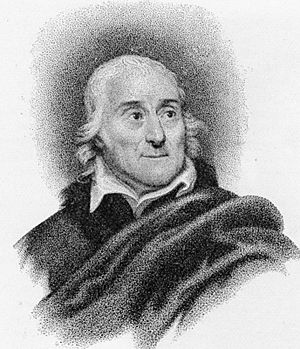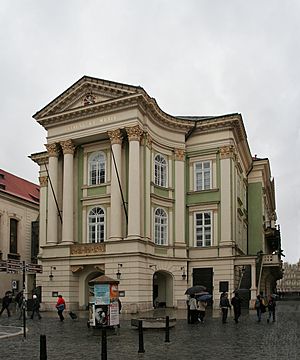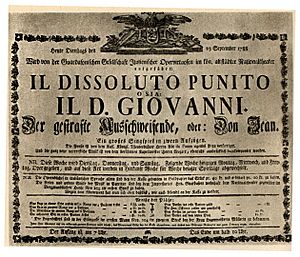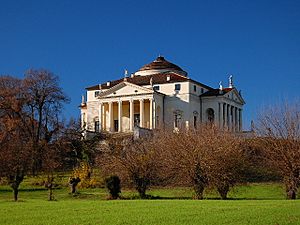Don Giovanni facts for kids
Quick facts for kids Don Giovanni |
|
|---|---|
| by Wolfgang Amadeus Mozart | |
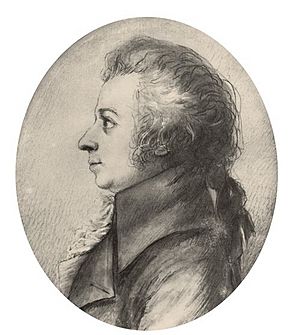
Mozart, 1789
|
|
| Genre | Opera in 2 acts |
| Librettist | Lorenzo da Ponte |
| Language | Italian |
| Premiere | National Theatre Prague, Bohemia 29 October 1787 |
| Other |
Operas by Mozart
Idomeneo (1781)
Die Entführung aus dem Serail (1782) The Marriage of Figaro (1786) Don Giovanni (1787) Così fan tutte (1790) The Magic Flute (1791) |
Don Giovanni is an Italian opera in two acts. It is about the character better known as Don Juan. The music was written by Wolfgang Amadeus Mozart. The libretto was written by Lorenzo da Ponte. The opera was first performed at the National Theatre in Prague on 29 October 1787. It was a great success.
Don Giovanni is about a murderer who refuses to repent when given the chance. He is taken alive to Hell. The story was originally a folktale. Plays, operas, and even a ballet were produced on the theme by the time Mozart and da Ponte started work on their opera.
Don Giovanni was performed across Europe after its success in Prague. It was performed in the United States in 1826, staged by da Ponte himself. In 1979, Joseph Losey made a movie of the opera. In 2013, Don Giovanni was tenth on the Operabase list of the most-performed operas in the world.
Contents
Principal characters
- Don Giovanni - baritone
- Donna Anna - soprano
- Donna Elvira - soprano
- Zerlina - soprano
- Don Ottavio - tenor
- Leporello - bass
- Masetto - bass
- Commendatore - bass
Background
Don Giovanni is based on a character in European folklore. This character is known as Don Juan. In 1581, the first play about Don Juan was written in Spanish by Juan de la Cueva. Other plays were also written.
Traveling actors performed the Don Juan plays in France and Italy . The Don Juan character became well known. There were French, German, and Italian plays. Molière wrote Dom Juan in 1665, and Thomas Shadwell wrote an English play in 1676. Carlo Goldoni wrote an Italian play in 1736. Mozart and da Ponte probably knew the Goldoni play.
The first opera was a French one written in 1713. It was a comic opera. Gluck wrote a ballet for Vienna in 1761. Vincenzo Righini wrote an opera that was performed in Vienna and Prague in 1777 — ten years before Don Giovanni. There were other operas written about Don Juan. The best known opera was one by Giovanni Bertati and Giuseppe Gazzaniga. It was performed in Venice in 1787. It was a great success. Da Ponte knew this opera. He made use of Bertati's libretto when he wrote Don Giovanni.
Mozart and da Ponte
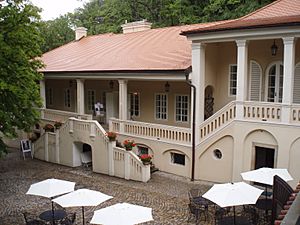
Mozart and da Ponte first met in Vienna in 1783. At that time, da Ponte promised to write a libretto for Mozart. Three years later, he adapted a French play called The Marriage of Figaro to an opera libretto for Mozart. In three months, Mozart had completed the music. The Marriage of Figaro had its first performance in Vienna on May 1, 1786. It was a great success.
In January 1787, Mozart went to Prague for the first performance of Figaro in that city. The opera was a wild success. The manager of the opera house hired Mozart to write an opera for Prague. In Vienna, Mozart asked da Ponte for a libretto. Da Ponte gave him Don Giovanni. Mozart started work on this new opera.
Mozart wrote most of Don Giovanni in the summer of 1787 in Vienna. Early in October, he went to Prague. He completed the opera in Prague at the Villa Bertramka, the home of friends. The first performance of the opera was postponed. The curtain rose on the world premiere of Don Giovanni at the National Theatre in Prague on October 29, 1787. The opera was a great success.
One critic wrote: "On Monday the 29th the Italian Opera performed Maestro Mozart's eagerly awaited Don Giovanni ... Music lovers and musicians say that nothing to equal it has every been seen before in Prague ... Mozart himself conducted and he was given three cheers ... The opera is uncommonly difficult to perform ... The crowd of spectators bears witness to its general acclaim."
There are many legends about the making of Don Giovanni. One legend says Luigi Bassi, the 22 year old singer playing Don Giovanni, wanted more music to sing. He was said to have forced Mozart to rewrite a duet five times. Another legend says Mozart flirted with all three sopranos in the opera. When one would reject his passes, he would simply move on to the next. Another legend says Mozart's wife Constanze kept her husband awake with funny stories the night before the first performance so he could complete the overture to the opera.
Vienna performance
Mozart left Prague for Vienna in November 1787. Music lovers in Vienna had heard good reports of Don Giovanni. The Emperor ordered the opera to be produced at the Burgtheater. Mozart wrote some new music for the characters of Elvira and Ottavio. He also wrote a duet for Zerlina and Leporello. Don Giovanni was first performed in Vienna on May 7, 1788. Mozart's sister-in-law Aloysia Lange sang Donna Anna.
Legend says the performance in Vienna ended with Don Giovanni going to Hell. The final scene for Anna, Elvira, Zerlina, Ottavio, Masetto, and Leporello was probably cut. Mozart wrote some new music for the Vienna performance. He may have had to cut the last scene to keep the performance within a certain length of time. The opera was not as successful in Vienna as it was in Prague. It was dropped at the Burgtheater after fifteen performances.
Other performances
Don Giovanni was performed all over Germany. It was performed in Poland in 1789. It was performed in German in Amsterdam and St Petersburg. The opera was popular in France, in both Italian and French versions. The first performance of Don Giovanni in Italy was at Bergamo in 1811. It was performed in Rome the same year. Its first performance in England may have been an amateur performance. In 1817 though, it was presented in both English and Italian. Lorenzo da Ponte produced the first American performance of Don Giovanni in New York City in 1826.
Discography
- 1934: Ezio Pinza (Don Giovanni), Rosa Ponselle (Donna Anna), Maria Müller (Donna Elvira), Edita Fleischer, (Zerlina) Tito Schipa (Don Ottavio), Virgilio Lazzari (Leporello), Louis D'Angelo (Masetto), Emanuel List (Commendatore); The Metropolitan Opera Orchestra and Chorus, Tullio Serafin - (Andromeda); (Live performance)
- 1936: John Brownlee (Don Giovanni), Ina Souez (Donna Anna), Luise Helletsgruber (Donna Elvira), Audrey Mildmay (Zerlina), Koloman von Pataky (Don Ottavio), Salvatore Baccaloni (Leporello), Roy Henderson (Masetto), David Franklin (Commendatore); Glyndebourne Festival Orchestra and Chorus, Fritz Busch - (EMI Classics)
- 1937: Ezio Pinza (Don Giovanni), Elisabeth Rethberg (Donna Anna), Luise Helletsgruber (Donna Elvira), Margit Bokor (Zerlina), Dino Borgioli (Don Ottavio), Virgilio Lazzari (Leporello), Karl Ettl (Masetto), Herbert Alsen (Commendatore); Chor der Wiener Staatsoper, Wiener Philharmoniker, Bruno Walter - (Urania); (Live performance)
- 1942: Ezio Pinza (Don Giovanni), Rose Bampton (Donna Anna), Jarmila Novotná (Donna Elvira), Bidu Sayão (Zerlina), Charles Kullman (Don Ottavio), Alexander Kipnis (Leporello), Mack Harrell (Masetto), Norman Cordon (Commendatore); The Metropolitan Opera Orchestra, Bruno Walter - (Andromeda); (Live performance)
- 1950: Tito Gobbi (Don Giovanni), Ljuba Welitsch (Donna Anna), Elisabeth Schwarzkopf (Donna Elvira), Irmgard Seefried (Zerlina), Anton Dermota (Don Ottavio), Erich Kunz (Leporello), Alfred Poell (Masetto), Josef Greindl (Commendatore); Chor der Wiener Staatsoper, Wiener Philharmoniker, Wilhelm Furtwängler - (EMI Classics); (Live performance)
- 1955: Cesare Siepi (Don Giovanni), Suzanne Danco (Donna Anna), Lisa Della Casa (Donna Elvira), Hilde Gueden (Zerlina), Anton Dermota (Don Ottavio), Fernando Corena (Leporello), Walter Berry (Masetto), Kurt Böhme (Commendatore); Wiener Staatsopernchor, Wiener Philharmoniker, Josef Krips - (Decca)
- 1958: Dietrich Fischer-Dieskau (Don Giovanni), Sena Jurinac (Donna Anna), Maria Stader (Donna Elvira), Irmgard Seefried (Zerlina), Ernst Haefliger (Don Ottavio), Karl-Christian Kohn (Leporello), Ivan Sardi (Masetto), Walter Kreppel (Commendatore); RIAS Kammerchor, Radio-Symphonie-Orchester Berlin, Ferenc Fricsay - (Deutsche Grammophon)
- 1959: Eberhard Wächter (Don Giovanni), Joan Sutherland (Donna Anna), Elisabeth Schwarzkopf (Donna Elvira), Graziella Sciutti (Zerlina), Luigi Alva (Don Giovanni), Giuseppe Taddei (Leporello), Piero Cappuccilli (Masetto), Gottlob Frick (Commendatore); Philharmonia Orchestra and Chorus, Carlo Maria Giulini - (EMI Classics)
- 1959: Cesare Siepi (Don Giovanni), Birgit Nilsson (Donna Anna), Leontyne Price (Donna Elvira), Eugenia Ratti (Zerlina), Cesare Valletti (Don Ottavio), Fernando Corena (Leporello), Heinz Blankenburg (Masetto), Arnold van Mill (Commendatore); Wiener Staatsopernchor, Wiener Philharmoniker, Erich Leinsdorf - (Decca)
- 1966: Nicolai Ghiaurov (Don Giovanni), Claire Watson (Donna Anna), Christa Ludwig (Donna Elvira), Mirella Freni (Zerlina), Nicolai Gedda (Don Ottavio), Walter Berry (Leporello), Paolo Montarsolo (Masetto), Franz Crass (Commendatore); New Philharmonia Orchestra & Chorus, Otto Klemperer - (EMI Classics)
- 1967: Dietrich Fischer-Dieskau (Don Giovanni), Birgit Nilsson (Donna Anna), Martina Arroyo (Donna Elvira), Reri Grist (Zerlina), Peter Schreier (Don Ottavio), Ezio Flagello (Leporello), Alfredo Mariotti (Masetto), Martti Talvela (Commendatore); Tschechischer Sängerchor Prag, Orchester Des Nationaltheaters Prag, Karl Böhm - (Deutsche Grammophon)
- 1968: Gabriel Bacquier (Don Giovanni), Joan Sutherland (Donna Anna), Pilar Lorengar (Donna Elvira), Marilyn Horne (Zerlina), Werner Krenn (Don Ottavio), Donald Gramm (Leporello), Leonardo Monreale (Masetto), Clifford Grant (Commendatore); The Ambrosian Singers, English Chamber Orchestra, Richard Bonynge - (Decca)
- 1973: Ingvar Wixell (Don Giovanni), Martina Arroyo (Donna Anna), Kiri Te Kanawa (Donna Elvira), Mirella Freni (Zerlina), Stuart Burrows (Don Ottavio), Wladimiro Ganzarolli (Leporello), Richard Van Allan (Masetto), Luigi Roni (Commendatore); Chorus and Orchestra of the Royal Opera House, Covent Garden, Colin Davis - (Philips)
- 1977: Sherrill Milnes (Don Giovanni), Anna Tomowa-Sintow (Donna Anna), Teresa Żylis-Gara (Donna Elvira), Edith Mathis (Zerlina), Peter Schreier (Don Ottavio), Walter Berry (Leporello), Dale Duesing (Masetto), John Macurdy (Commendatore); Wiener Staatsopernchor, Wiener Philharmoniker, Karl Böhm - (Deutsche Grammophon)
- 1978: Bernd Weikl (Don Giovanni), Margaret Price (Donna Anna), Sylvia Sass (Donna Elvira), Lucia Popp (Zerlina), Stuart Burrows (Don Ottavio), Gabriel Bacquier (Leporello), Alfred Sramek (Masetto), Kurt Moll (Commendatore); London Opera Chorus, London Philharmonic Orchestra, Georg Solti - (Decca)
- 1983: Thomas Allen (Don Giovanni), Carol Vaness (Donna Anna), Maria Ewing (Donna Elvira), Elizabeth Gale (Zerlina), Keith Lewis (Don Ottavio), Richard Van Allan (Leporello), John Rawnsley (Masetto), Dimitri Kavrakos (Commendatore); Glyndebourne Festival Chorus, London Philharmonic Orchestra, Bernard Haitink - (EMI Classics)
- 1985: Samuel Ramey (Don Giovanni), Anna Tomowa-Sintow (Donna Anna), Agnes Baltsa (Donna Elvira), Kathleen Battle (Zerlina), Gösta Winbergh (Don Ottavio), Ferruccio Furlanetto (Leporello), Alexander Malta (Masetto), Paata Burchuladze (Commendatore); Chor der Deutschen Oper Berlin, Berliner Philharmoniker, Herbert von Karajan - (Deutsche Grammophon)
- 1990: William Shimell (Don Giovanni), Cheryl Studer (Donna Anna), Carlo Vaness (Donna Elvira), Susanne Mentzer (Zerlina), Frank Lopardo (Don Ottavio), Samuel Ramey (Leporello), Natale de Carolis (Masetto), Jan-Hendrik Rootering (Commendatore); Konzertvereinigung Wiener Staatsopernchor, Wiener Philharmoniker, Riccardo Muti - (EMI Classics)
- 1990: Thomas Allen (Don Giovanni), Sharon Sweet (Donna Anna), Karita Mattila (Donna Elvira), Marie McLaughlin (Zerlina), Francisco Araiza (Don Ottavio), Simone Alaimo (Leporello), Claudio Otelli (Masetto), Robert Lloyd (Commendatore); Ambrosian Opera Chorus, Academy of St. Martin-in-the-Fields, Neville Marriner - (Philips)
- 1994: Rodney Gilfry (Don Giovanni), Luba Orgonasova (Donna Anna), Charlotte Margiono (Donna Elvira), Eirian James (Zerlina), Christoph Prégardien (Don Ottavio), Ildebrando D'Arcangelo (Leporello), Julian Clarkson (Masetto), Andrea Silvestrelli (Commendatore); Monteverdi Choir, English Baroque Soloists, John Eliot Gardiner - (Archiv Produktion)
- 1996: Bryn Terfel (Don Giovanni), Renée Fleming (Donna Anna), Ann Murray (Donna Elvira), Monica Groop (Zerlina), Herbert Lippert (Don Ottavio), Michele Pertusi (Leporello), Roberto Scaltriti (Masetto), Mario Luperi (Commendatore); London Voices, London Philharmonic Orchestra, Georg Solti - (Decca)
- 1997: Simon Keenlyside (Don Giovanni), Carmela Remigio (Donna Anna), Soile Isokoski (Donna Elvira), Patrizia Pace (Zerlina), Uwe Heilmann (Don Ottavio), Bryn Terfel (Leporello), Ildebrando D'Arcangelo (Masetto), Matti Salminen (Commendatore); Coro Di Ferrara Musica, Chamber Orchestra of Europe, Claudio Abbado - (Deutsche Grammophon)
Joseph Losey's movie
In 1979, Joseph Losey made a movie of the opera. Baritone Ruggero Raimondi played Don Giovanni. Edda Moser, Kiri Te Kanawa and Teresa Berganza played the three ladies in the opera. The movie was made in Venice instead of Spain. It used Renaissance architect Andrea Palladio's Villa Capra near Venice as its setting.
Vincent Canby wrote in the New York Times on November 6, 1979: " ... the climactic confrontation between the Don and the Commendatore is surprisingly tepid visually. I've seen better descents into hell at our own Metropolitan Opera and in any number of Hammer horror pictures. Mr. Losey and his associates haven't destroyed "Don Giovanni," but then they haven't illuminated it either. Their film is a busy, disorienting spectacle, superbly sung ... "
Images for kids
-
The Estates Theatre in Prague, venue of the world premiere of Don Giovanni in 1787 when it was four years old and called the Comital Nostitz National Theatre (Gräflich Nostitzsches Nationaltheater)
-
Ildebrando D'Arcangelo as Don Giovanni, Salzburg Festival 2014
See also
 In Spanish: Don Giovanni para niños
In Spanish: Don Giovanni para niños


